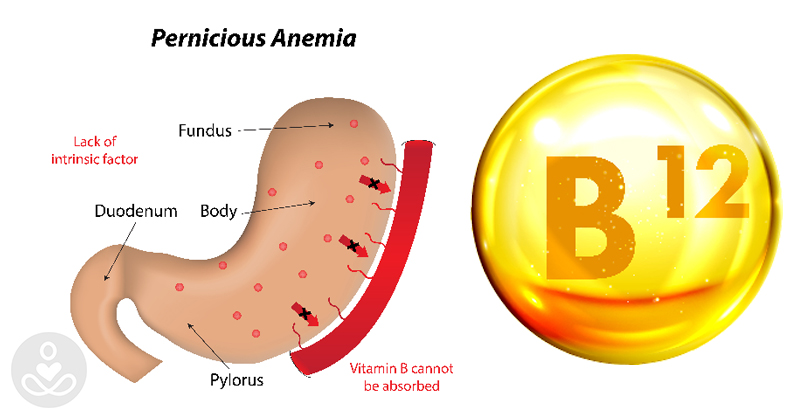In a world where there is food available on almost every corner, vitamin deficiency is still a major factor of poor health in developed countries. While some say changes in our soil are to blame for nutrient deficiencies, there are many reasons why in a country where people eat too much, they still fall short nutritionally.
7 Most Common Nutrient Deficiencies

Nutrient deficiencies occur when your body does not absorb the necessary amount of a given nutrient. This is usually caused by poor intake (low-quality diet lacking in variety or a restrictive diet), certain diseases and conditions such as colon cancer or Crohn’s disease, bariatric surgery, aging, and pregnancy. The amounts of each vitamin and mineral you need depend on your sex, age, activity level – even ethnicity and race can be factors.
Read More: B vitamins could help treat severe nonalcoholic fatty liver disease
Some of the most common nutrient deficiencies in North America are (14) :
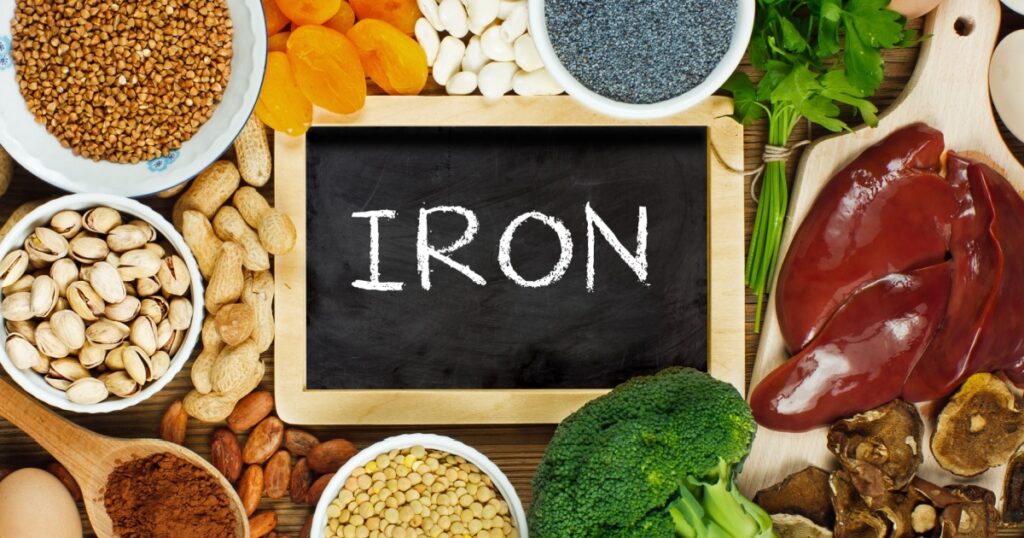
- Iron
- Iodine
- Vitamin A
- Vitamin D
- Calcium
- Magnesium
- Vitamin B12
Vitamin B12

Also known as cobalamin, Vitamin B12 is a water-soluble vitamin responsible primarily for blood formation, brain, and nerve function. Our bodies cannot make B12, so we have to get it from our diets on a daily basis, and it needs the help of the protein intrinsic factor to be absorbed. It is found only in animal-based foods, with a few exceptions. Neurological symptoms of Vitamin B12 deficiency may be irreversible, so early diagnosis is crucial.
Cognitive Disorders

Studies link low B12 levels in the body to depression and the onset of dementia. Even scarier, research suggests that supplementing had no effect on reversing the damage for those already suffering from dementia. (1)
Elevated Homocysteine Levels

Homocysteine is an amino acid created from the breakdown of protein. High levels of this amino acid is a risk factor for several diseases, including Alzheimer’s Disease, heart attack, and stroke. (2)
Megaloblastic Anemia
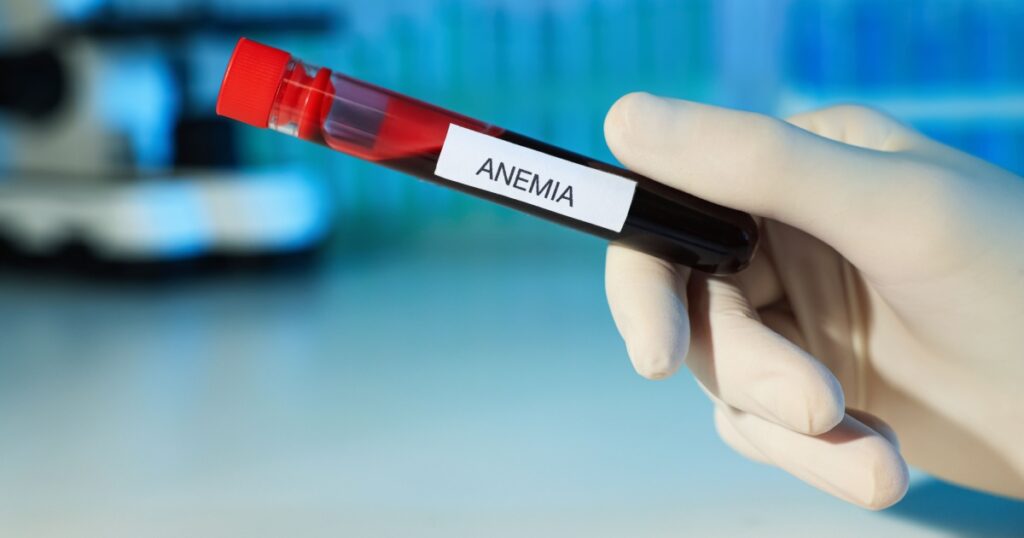
Megaloblastic anemia occurs when your bone marrow produces unusually large, structurally abnormal, immature red blood cells (megaloblasts). This causes your overall red blood cell count to decrease, which means less oxygen gets carried to the tissues and organs that need it. Symptoms include numbness in your extremities, nausea, diarrhea, fatigue, muscle weakness, and wasting. (3)
Read More: Warning: 4 Common Vitamins Can Become Toxic If You Take Too Much
Impaired Infant Development

B12 deficiency in mothers can be detrimental to both the physical and cognitive development of their babies — risking severe abnormalities and impaired brain function. (4) (5)
High-Risk Individuals of B12 Deficiency
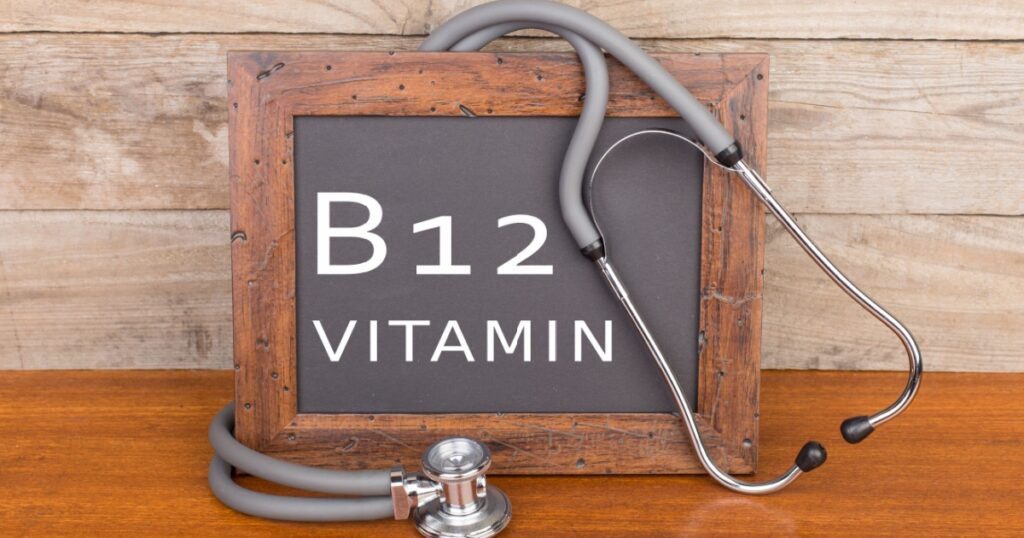
Vitamin B12 deficiency can be a serious health concern, particularly for individuals who fall into certain high-risk groups. This essential nutrient plays a critical role in maintaining healthy nerve cells and producing DNA, and a deficiency can lead to a range of health issues including anemia, fatigue, and neurological problems. While vitamin B12 is naturally found in a variety of animal products such as meat, fish, eggs, and dairy, some individuals may not get enough of it due to dietary choices, medical conditions, or age-related changes. Recognizing the groups most vulnerable to B12 deficiency can help in early detection and appropriate intervention to prevent serious complications.
Individuals who are most at risk for B12 deficiency are (6):

- Vegans and/or vegetarians
- Pregnant or breast feeding women
- Gastrointestinal issues such as stomatitis, anorexia, or chronic diarrhea
- Gastrointestinal disorders such as Crohn’s disease, stomach infections, and stomach restrictions
- Bariatric surgery patients
Signs and Symptoms of B12 Deficiency
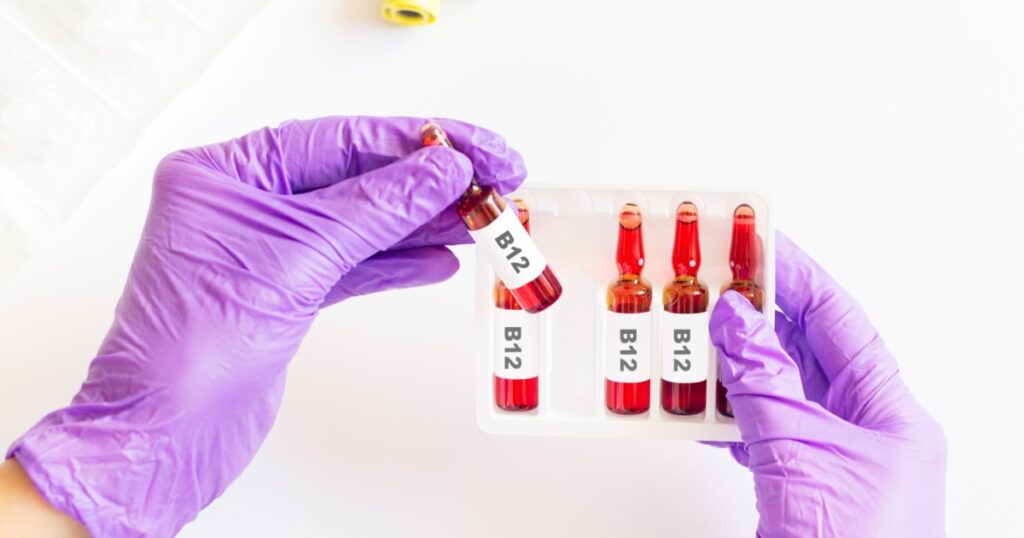
Vitamin B12 deficiency can manifest through a variety of signs and symptoms that affect different body systems. Since vitamin B12 is essential for nerve function, red blood cell production, and DNA synthesis, a deficiency can lead to anemia, fatigue, weakness, and shortness of breath. Neurological symptoms such as numbness, tingling in the hands and feet, and balance issues may also occur due to impaired nerve function. Additionally, cognitive changes, including memory problems and difficulty concentrating, can arise. Early detection and treatment are crucial to avoid long-term complications and improve overall health and well-being.
Read More: 6 Signs Your Vitamin B6 Levels Are Low
Iron Deficiency

B12 deficiency is often masked by an iron deficiency — especially in menstruating women. B12 aids the absorption of iron, so one deficiency will lead to the other. (12)
Constant Fatigue

A lack of B12 in the body means that your cells are not getting enough oxygen, leaving you feeling tired and lethargic. Constant fatigue despite proper sleep is a big red flag of potential B12 deficiency. (13) Even the most comfortable pair of pajamas can’t seem to help!
Pins and Needles

Unexplained pins and needles, numbness, and shock wave-like feelings throughout your body may be a sign of the nerve damage that results from lack of oxygen to your cells. (13)
Forgetfulness

Sure, we all occasionally forget a family member’s birthday or search frantically for the sunglasses sitting on our head, but when forgetfulness becomes more severe, this could be a sign of B12 deficiency. (13)
Dizziness

While it is normal to have the occasional head rush when we stand up too quickly, too frequent episodes of dizziness and vertigo are a sign of a bigger problem. (13)
Muscle Weakness

As women, we often play our difficulty with certain everyday tasks off as just being weak. Chronic struggle to complete daily tasks, however, is a sign of B12 deficiency. (13)
Vision Trouble

Extreme light sensitivity, blurred vision, and spotting are common problems experienced by those with B12 deficiency, not just due to aging. If untreated, permanent damage can be done to the optic nerve. (13)
Pale Complexion

One of vitamin B12’s main responsibilities is red blood cell formation. A paler-than-usual complexion may be a sign of deficiency or anemia. (13)
Read More: Scientists Reveal New Findings About Older Adults Who Take Vitamin D
5 Ways to Increase B12 (Without Supplementation)

Maintaining adequate levels of vitamin B12 is essential for overall health, as this nutrient plays a vital role in various bodily functions, including nerve health and red blood cell production. For those who prefer to avoid supplements, there are several natural ways to increase B12 intake and absorption through dietary and lifestyle choices. Here are five effective methods to boost your vitamin B12 levels without supplementation:
Food

Whole foods are one of the best sources of our daily required nutrients. Dietary sources of vitamin B12 include (7): Dietary sources of vitamin B12 include (7) shellfish, especially clams and oysters. organ meats, meat, especially red meat, eggs, milk products, and, nori and tempeh*
* Vegetarians and vegans are a high-risk group and eating plenty of these foods may not be enough to meet requirements. It’s always a good idea to work with your healthcare provider to get regular lab work done in order to monitor your B12 levels and supplement if needed.
Limit Alcohol

Excessive alcohol intake may decrease absorption of B12 interfering with the body’s ability to produce intrinsic factor, the protein required for the body to absorb B12. (8) According to the Dietary Guidelines for Americans, moderate alcohol consumption is defined as having up to 1 drink per day for women and up to 2 drinks per day for men. This definition refers to the amount consumed on any single day and is not intended as an average over several days.
Proper Calcium Intake

Calcium aids in the absorption of B12, so be sure to include plenty of calcium-rich foods in your diet, such as green leafy vegetables and dairy products. (9)
Add Pepper to Your Food
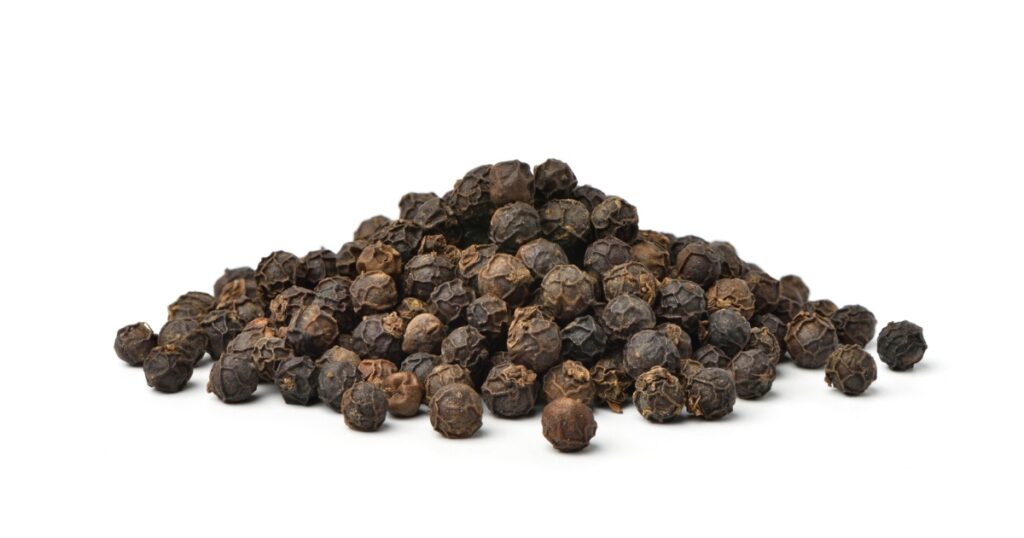
Besides adding flavor, “piperine“, a compound in black pepper, may increase the absorption of B12 from your food. Crack some fresh pepper on your next meal, or try this nutrient powerhouse drink. (10)
Drink Cranberry Juice

Studies have found that cranberries, cranberry juice, and cranberry capsules may help to increase the absorption of B12. Avoid sugar-loaded cranberry cocktails and fruit drinks and try one of these healthy cranberry recipes. (11)
Read More: Vitamin B12 Deficiency Symptoms that Most People Ignore
Sources
- https://www.ncbi.nlm.nih.gov/pmc/articles/PMC3874776/
- https://stroke.ahajournals.org/content/33/10/2351.short
- https://www.clinmedres.org/content/4/3/236.short
- https://www.ncbi.nlm.nih.gov/pubmed/6378487
- https://nutritionreviews.oxfordjournals.org/content/66/5/250.short
- https://www.aerzteblatt.de/pdf/DI/105/40/m680.pdf
- https://journals.sagepub.com/doi/abs/10.3181/0703-mr-67
- https://care.diabetesjournals.org/content/23/9/1227.short
- https://www.google.com/patents/US5536506
- https://www.novapharmacy.com.au/all-health-topics/herbs/cranberry/
- https://www.webmd.com/a-to-z-guides/tc/vitamin-b12-deficiency-anemia-topic-overview
- https://www.webmd.com/food-recipes/guide/vitamin-b12-deficiency-symptoms-causes#2-3
- https://www.ewg.org/research/how-much-is-too-much/appendix-b-vitamin-and-mineral-deficiencies-us
